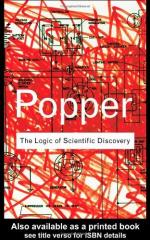
|
| Name: _________________________ | Period: ___________________ |
This quiz consists of 5 multiple choice and 5 short answer questions through Part II: Chapter 8, Probability.
Multiple Choice Questions
1. Statements that are not testable serve what purpose?
(a) Judge science.
(b) Validate previous experience.
(c) Suggest a problem.
(d) They serve no purpose.
2. The success of a theory is base on what comparison?
(a) To the singular statements.
(b) To the scientist's point of view.
(c) To other theories.
(d) To the experimental justification.
3. What refers to a term that does not need a definition but is learned through experience?
(a) Existential term.
(b) Advanced term.
(c) Primitive term.
(d) Epistemological term.
4. What occurs with non-numerical probability statements when converted into numerical problems?
(a) There are more degrees of freedom.
(b) Their meaning is distorted.
(c) They gain power.
(d) They invalidate the problem.
5. How does Popper investigate the chain of logical reasoning?
(a) Breaking it into steps.
(b) Understanding metaphysics.
(c) Relying of previous research.
(d) Identifying trends.
Short Answer Questions
1. What are hypothetical estimates of frequency?
2. In order to validate his theory, what does Popper categorize regarding frequency theory?
3. What can observation do for science?
4. How must scientific statements be tested?
5. What is the theory of theories?
|
This section contains 207 words (approx. 1 page at 300 words per page) |

|




